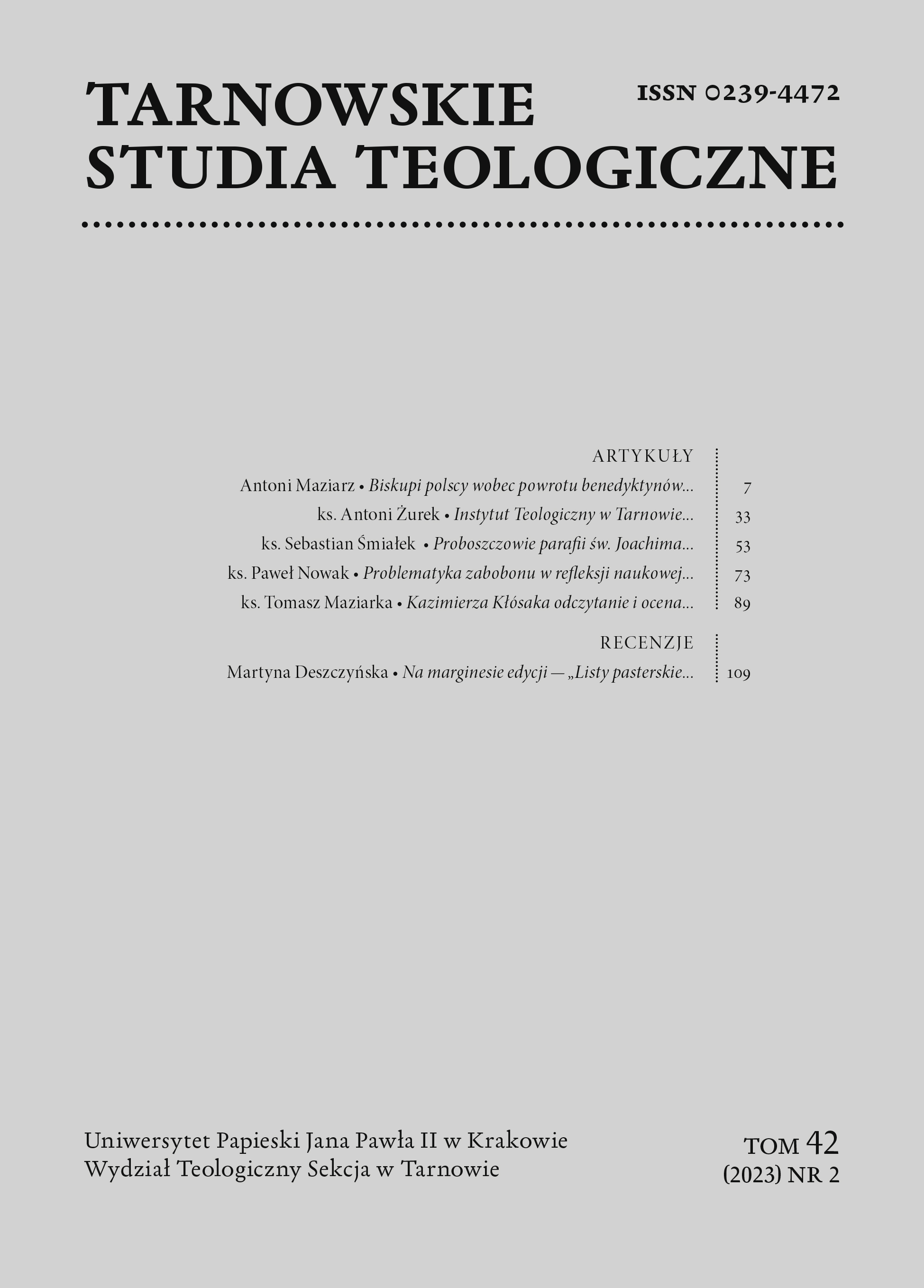The issue of superstition in scientific reflection and Church teaching
DOI:
https://doi.org/10.15633/tst.42204Keywords:
superstition, Church, cultural phenomenon, moral teachingAbstract
The topic of superstition is very topical at the present time. It can be noticed that with the weakening of faith and religiosity, interest in various forms of superstition is growing very intensively. There are even communities and “churches” that propose practicing a “cult” based entirely on superstition. The subject of reflexion in this elaboration is superstition understood as abnormality in a religious cult that inspires itself with an incorrectly understood godliness. The universal and timeless scale of this phenomenon is an inspiration to undertake academic searches concerning its roots. In the era of confrontation of diverseness in the sphere of culture, that is symptomatic for globalization, it is noticeable that the topic of superstition returns with a surprising regularity and gives a number of questions to a present man. Furthermore, the phenomenon of superstition seems to inspire operation of the nowadays local cultures creators and representatives of specific age categories. It seems that in the present situation it is necessary to explain fundamental rights that will allow to interpret this cultural phenomenon in an appropriate manner and become an effective factor that puts its assessment in an order. Hence, there is a lot of ethnographic works that examine the superstition phenomenon and indicate that it is still present in the life of a modern man. To some extent, this article can be perceived as a care for an appropriate understanding of the superstition as it presents its various definitions and attributes, shows psychological and sociological aspects of this phenomenon, and also explains the modern philosophical thought and the Catholic Church doctrinal and moral assessment concerning this phenomenon.
References
Bacon F., Eseje, Warszawa 1959.
Bagehot W., O początku narodów, Warszawa 1875.
Berwiński R., Studia o gusłach, czarach, zabobonach, t. 1–2, Poznań 1862.
Bocheński J., Sto zabobonów. Krótki filozoficzny słownik zabobonów, Kraków 1992.
Brückner A., Słownik etymologiczny języka polskiego, Warszawa 1998.
Chwalba A., Czekalski T., Obyczaje w Polsce. Od średniowiecza do czasów współczesnych, Warszawa 2004.
Czerwiński M., Magia mit i fikcja, Warszawa 1975.
Defoe D., Dziennik roku zarazy, Warszawa 1959.
Drożdż A., Człowiek Bogu. Teologia moralna szczegółowa, cz. 1, Tarnów 2000.
Eliade M., Okultyzm, czary, mody kulturalne, Kraków 1992.
Encyklopedia powszechna, nakład, druk i własność S. Orgelbranda, t. 4, Warszawa 1899.
Frazer J. G., Złota gałąź, Warszawa 1962.
Freud S., Psychopatologia życia codziennego, Lwów 1913.
Huizinga J., Jesień średniowiecza, Warszawa 1992.
Hume D., Eseje z dziedziny moralności i literatury, Warszawa 1955.
Hume D., Badania dotyczące rozumu ludzkiego, Warszawa 1977.
Jahoda G., Psychologia przesądu, Warszawa 1971.
Jan Paweł II, Encyklika Fides et ratio, 14.09.1998.
Jaźwiecka-Bujalska D., Między magią a religią, czyli zabobony i przesądy wśród duchowieństwa katolickiego we współczesnej Polsce, Kraków 2000.
Katechizm Kościoła Katolickiego, Poznań 1994.
Kołakowski L., Mini wykłady o maxi sprawach, Kraków 1999.
Kopaliński W., Słownik mitów i tradycji kultury, Warszawa 1991.
Kopaliński W., Słownik symboli, Warszawa 1991.
Królikowski J., Wyklinam cię i wypędzam. Podstawy teologii i praktyki egzorcyzmów, Kraków 2003.
Litwiniszyn A., O przesądzie. Studium historyczno-filozoficzne, Kraków 2001.
Locke J., Rozważania dotyczące rozumu ludzkiego, t. 1–2, Warszawa 1955.
Mill J. S., System logiki dedukcyjnej i indukcyjnej, Warszawa 1962.
Nowa encyklopedia powszechna, t. 5, Warszawa 1996.
Paweł VI, Adhortacja apostolska Evangelii nuntiandi, 8.12.1975.
Plezia M., Słownik łacińsko-polski, t. 5, Warszawa 1979.
Podręczna encyklopedya kościelna, t. 41–42, Poznań–Warszawa 1916.
Słownik współczesnego języka polskiego, t. 5, Kraków 2002.
Spinoza B., Traktat teologiczno-polityczny, w: B. Spinoza, Dzieła, t. 2, Warszawa 1916.
Sobór Watykański II, Konstytucja duszpasterska o Kościele w świecie współczesnym Gaudium et spes, 7.12.1965.
Sobór Watykański II, Konstytucja o liturgii świętej Sacrosanctum concilium, 4.12.1963.
Szczur S., Historia Polski. Średniowiecze, Kraków 2002.
Tuwim J., Czary i czarty polskie oraz wypisy czarnoksięskie, Warszawa 1960.
Wielka encyklopedia powszechna, t. 12, Warszawa 1969.
Witek S., Duszpasterstwo w konfesjonale, Poznań 1988.
Wojciechowski M., Przesądy i etyka, „Przegląd Katolicki” 12 (1988), s. 6.
Żurakowski J., Zabobonność inteligencji w praktyce duszpasterskiej, „Ateneum Kapłańskie” 55 (1957), s. 419–430.
Downloads
Published
Issue
Section
License

This work is licensed under a Creative Commons Attribution 4.0 International License.
Authors who publish with this journal agree to the following terms:
- Authors retain the copyright and full publishing rights without restrictions, and grant the journal right of first publication with the work simultaneously licensed under a Creative Commons Attribution 4.0 International License that allows others to share the work with an acknowledgement of the work's authorship and initial publication in this journal.
- Authors are able to enter into separate, additional contractual arrangements for the non-exclusive distribution of the journal's published version of the work (e.g., post it to an institutional repository or publish it in a book), with an acknowledgement of its initial publication in this journal.
- Authors are permitted and encouraged to post their work online (e.g., in institutional repositories or on their website) prior to and during the submission process, as it can lead to productive exchanges, as well as earlier and greater citation of published work (See The Effect of Open Access).

